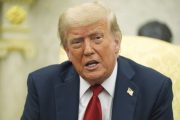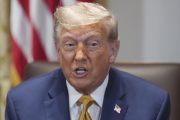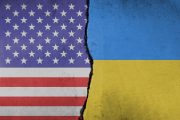A previously undisclosed e-mail from a top State Department official identified the terrorist organization that carried out the September 11, 2012 attack on the U.S. mission in Benghazi, Rep. Trey Gowdy (R-S.C.) said Wednesday. The e-mail went out four days before U.S. Ambassador to the United Nations Susan Rice said in several TV interviews that the assault grew out of a “spontaneous demonstration.”
Gowdy said the September 12 e-mail was sent to senior State Department officers from Elizabeth Jones, acting secretary of state for Near Eastern Affairs. The South Carolina Republican, a member of the House Oversight and Government Reform Committee, read the message aloud at a committee hearing on the attack that killed U.S. Ambassador to Libya J. Christopher Stevens and three members of his staff. Gowdy said the e-mail is not classified, but claimed Democrats on the committee had blocked its release. He urged the Democrats to exercise “bi-partisanship” by agreeing to make the document public.
Jones wrote that she had spoken with the Libyan ambassador to Washington, Gowdy said, quoting: “I told him that the group that conducted the attacks, Ansar al-Sharia, is affiliated with Islamic terrorists.”
“Let me say that again,” Gowdy said. “She told him. The State Department, on September 12, days before our ambassador went on national television, is telling the ambassador to Libya the group that conducted the attacks, Ansar al-Sharia, is affiliated with terrorists.”
Gregory Hicks, deputy chief of mission under Stevens, said Libyan President Mohammed Magariaf was on U.S. television talking about the planned terrorist attack on the U.S. mission on the same day Rice was on five Sunday morning interview programs saying a “spontaneous demonstration” at the consulate had been “hijacked” by extremists. Hicks, who was at the U.S. embassy in Tripoli at the time, told the committee there was no evidence of a demonstration prior to the heavily armed assault and that he was certain Stevens would have called to tell him about it if there had been.
When asked what impact Rice’s comments had on relations between the United States and the Libyan government, Hicks said U.S. officials ran into bureaucratic resistance and that it took about 18 days before the FBI was allowed in to investigate.
“The crime scene was unsecured for 18 days?” Gowdy asked, his voice rising.
“Yes,” Hicks replied.
Ansar al-Sharia is an affiliate of al-Qaeda and House Republicans have accused the Obama White House and senior State Department officials of deleting references to al-Qaeda or terrorism from the “talking points” given to Rice. The attack occurred during last year’s presidential election campaign, when the killing of al-Qaeda leader Osama bin Laden and success in the war on terrorism were major Obama campaign themes.
According to a report from House Republicans released in April, State Department spokeswoman Victoria Nuland wrote in an e-mail that “my building leadership” at the State Department was not happy with the original talking points prepared by the CIA. Within the next 24 hours, the talking points had been edited and references to Islamic terrorism removed, the report said.
Rep. John Tierney (D-Mass.) said the House Intelligence Committee had already investigated the talking points issue. “Gen. Petraeus, the former head of the CIA, made it clear that the change was made to protect classified sources of information — not to spin it, not to politicize it — and it wasn’t done at the direction of the White House,” Tierney said.
Hicks, one in a panel of three State Department “whistleblowers” appearing before the committee Wednesday, is the first person who was in Libya at the time to publicly testify about the Benghazi attack. He described the three waves of attacks that occurred from the night of September 11 into the next morning, and became choked up at times when describing the courage and heroism of the diplomats trapped in the compound during the heavily armed assault. He also repeated previous testimony he had given to committee investigators about a four-man team of special operations forces that was ordered not to fly from Tripoli to Benghazi to reinforce troops defending U.S. diplomatic personnel in the early morning hours of September 12. A previous team had arrived in Benghazi at 1:15 a.m., Hicks said, and the second Special Forces unit was about to drive to a C-130 aircraft when its commander, Lt. Col. Gibson, got a phone call from a superior at Special Operations Command Africa. “They were told not to board the flight, so they missed it,” Hicks told the committee.
Asked how the unit responded to the order, Hicks said, “They were furious.” He quoted Gibson as saying “I have never been so embarrassed in my life that a State Department officer has bigger balls than somebody in the military.”
The State Department cited a report by an Administrative Review Board appointed by then-Secretary of State Hillary Rodham Clinton to investigate the attack and its aftermath.
“The interagency response was timely and appropriate, but there simply was not enough time given the speed of the attacks for armed U.S. military assets to have made a difference,” according to a statement issued by the department. “Senior-level interagency discussions were underway soon after Washington received initial word of the attacks and continued through the night.”
Mark Thompson, former deputy coordinator of the State Department’s counterterrorism bureau, was questioned by committee member Eleanor Holmes, a Democrat form the District of Columbia, about a statement attributed to him in news reports alleging that Clinton and Under Secretary for Management Patrick Kennedy had tried to keep the bureau out of the discussion and decision-making process on the night of the attack. Homes cited an emphatic denial issued Monday by Daniel Benjamin, then the head of the bureau. Thompson said it was the bureau’s Foreign Emergency Support Team, known by its initials, FEST, that was not involved in the discussions. Thompson said the FEST unit, which he headed, had responded to similar attacks in the past, including the 1998 attack on the U.S. embassy in Nairobi, Kenya, and the bombing of the USS Cole off coast of Yemen in October 2000.
Eric Nordstrom, the former regional security officer in Libya, has criticized the State Department over denials of requests for added security in Benghazi in the months leading up to the attack. He told the committee Wednesday that he had spoken up because he wanted to get the truth out.
“It matters to me personally and it matters to my colleagues at the Department of State,” he said. “It matters to the American public for whom we serve, and most importantly it matters to the friends, the family” of those killed.
Democrats accused Committee Chairman Rep. Darrell Issa (R-Calif.) of using the witnesses in an effort to score partisan political points against the Obama administration and against Clinton, generally considered a likely presidential candidate in 2016. Holmes and ranking Democrat Elijah Cummings of Maryland were among the committee members taking Issa to task over his previous statement that Secretary Clinton had lied and misled the American people by denying she had seen requests that had come to the State Department for added security in Benghazi. Issa claimed Clinton had signed a document refusing such a request. Holmes said the document Issa had cited did not have the Secretary’s signature, but only her printed name at the bottom of the page, as is the case with thousands of documents that go out from the State Department. The D.C. Democrat noted that the Washington Post fact checker had given Issa “four Pinnochios” over the charge.
“I don’t think there’s a smoking gun here today,” said Rep. Mark Pocan, (D-Wisc.) “Not even a lukewarm slingshot.” He suggested the committee stop “rehashing” old stories.
That brought a rejoinder from Gowdy, who said the committee needed to keep probing for the truth. “The good news is there is no statute of limitations on truth,” he said.




